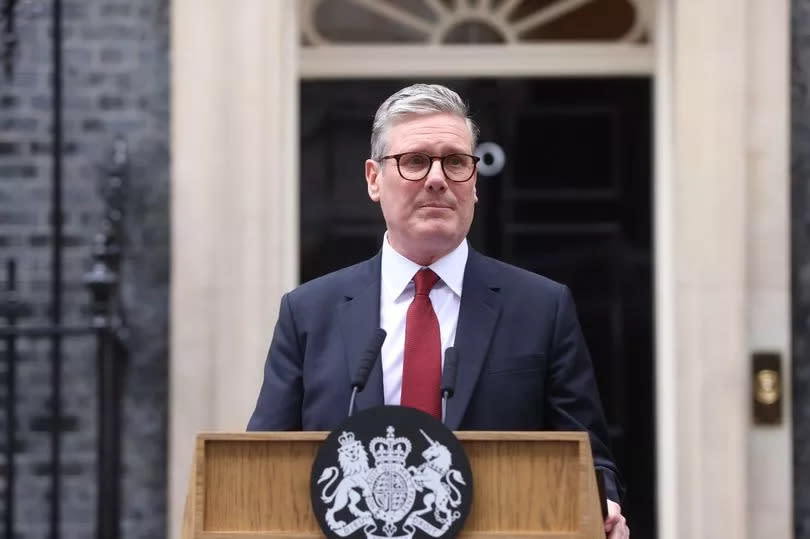What happens in the Houses of Parliament today? First day for new MPs explained

The Houses of Parliament are set to meet for the first time since the General Election today, Tuesday July 9, with the new cohort of MPs gathering to elect a Speaker for the House of Commons.
Having served in the role since 2019, Sir Lindsay Hoyle is expected to put himself forward as Speaker, but it will be up to MPs to decide whether he will remain in the job. The day will also see Keir Starmer say his first words at the despatch box as Prime Minister, before 643 MPs (excluding the seven Sinn Fein members elected in Northern Ireland), must swear an oath of allegiance to the crown.
The process comes ahead of Parliament's State Opening next week, which will see King Charles set out the new Government's agenda in his House of Lords speech on Wednesday, July 17. Here, the PA news agency breaks down what will happen today on the new MPs' first day in Parliament, from electing a Speaker to the swearing in process.
What must happen first before MPs and peers can get to work?
The House of Commons must first elect a Speaker. The Commons will meet at 2.30pm with Conservative MP Sir Edward Leigh, as the new Father of the House given he has the the longest record of continuous service, presiding over matters.
Black Rod Sarah Clarke, a senior Lords officer, will arrive at approximately 2.40pm and summon MPs to the House of Lords. Sir Edward will be accompanied by the Clerk of the House, frontbenchers from both sides and any other MPs who wish to head across to the Lords, where a Royal Commission will direct them to choose a Speaker.
The MPs will then return to the Commons and Sir Edward will preside over the election.
Who are the candidates for the Speaker?
Sir Lindsay Hoyle is expected to be re-elected to the position he has held since November 2019. The Chorley MP stood at the General Election as the "Speaker seeking re-election", with Labour and the Conservatives among the parties not putting up a challenger.
Sir Lindsay will be asked to signal he wants to be chosen again as Speaker and Sir Edward will call an MP to move a motion to propose this. If MPs approve the motion, Sir Lindsay will take the chair as Speaker-elect and at a later stage his appointment will be confirmed by the royal commissioners on behalf of the King.
If MPs disagree with Sir Lindsay's re-election as Speaker then other MPs would put themselves forward for the role and a secret ballot would take place on Wednesday July 10.
Once approved, the Speaker would likely make a speech and congratulatory remarks follow from senior MPs, including the party leaders. The House will suspend for a short period of time.
Sir Lindsay will choose some temporary deputy speakers to assist him before permanent ones are chosen by secret ballot. The arrangements for this process will be announced in due course.
What is the swearing in process?
MPs are required by law to make an oath or affirmation of allegiance to the Crown and are not allowed to speak in debates, vote or receive their salary until they do so. The swearing in process could begin on Tuesday and the first MPs to be involved include Sir Edward, members of the Cabinet and shadow cabinet, other privy counsellors and ministers.
MPs are then expected to be called in order of length of service in the House. The swearing-in process in the Commons would be expected to continue on July 10, 11, 15 and 16. No other business takes place in this period.
The House of Lords will hold sessions for swearing-in on Tuesday and Wednesday of this week. Peers are not required to swear-in after an election unless they are a new member of the House.
During the swearing in process, an MP will be called forward and they'll announce their name and constituency, choose whether to swear-in using a religious text or take a non-religious affirmation. They then usually have a short chat with the occupant of the Speaker's chair.
There will usually be queues at the start of each day and the sitting could be suspended at different times if things are quiet. Some MPs make clear they do not support the monarchy while swearing-in. In the past, MPs have been seen crossing their fingers while pledging allegiance or making clear they are only doing it because they have to in order to serve their constituents.
What's next? King's Speech and PMQs
Next, the business of the House can start to get under way. The King's Speech, which will outline the Government’s legislative priorities and formally open Parliament, takes place on July 17.
It will then be debated over five or six days, with amendments able to be put forward and voted upon. The first Prime Minister's Questions for Sir Keir Starmer as Prime Minister could take place on July 24.
Westminster watchers will also be keen to find out when the summer recess takes place, with details potentially emerging during the first business statement of the new Government on July 18. But with Labour keen to press on with its agenda after the election, it is expected the summer recess will be shorter than in previous years.

 Yahoo News
Yahoo News 
